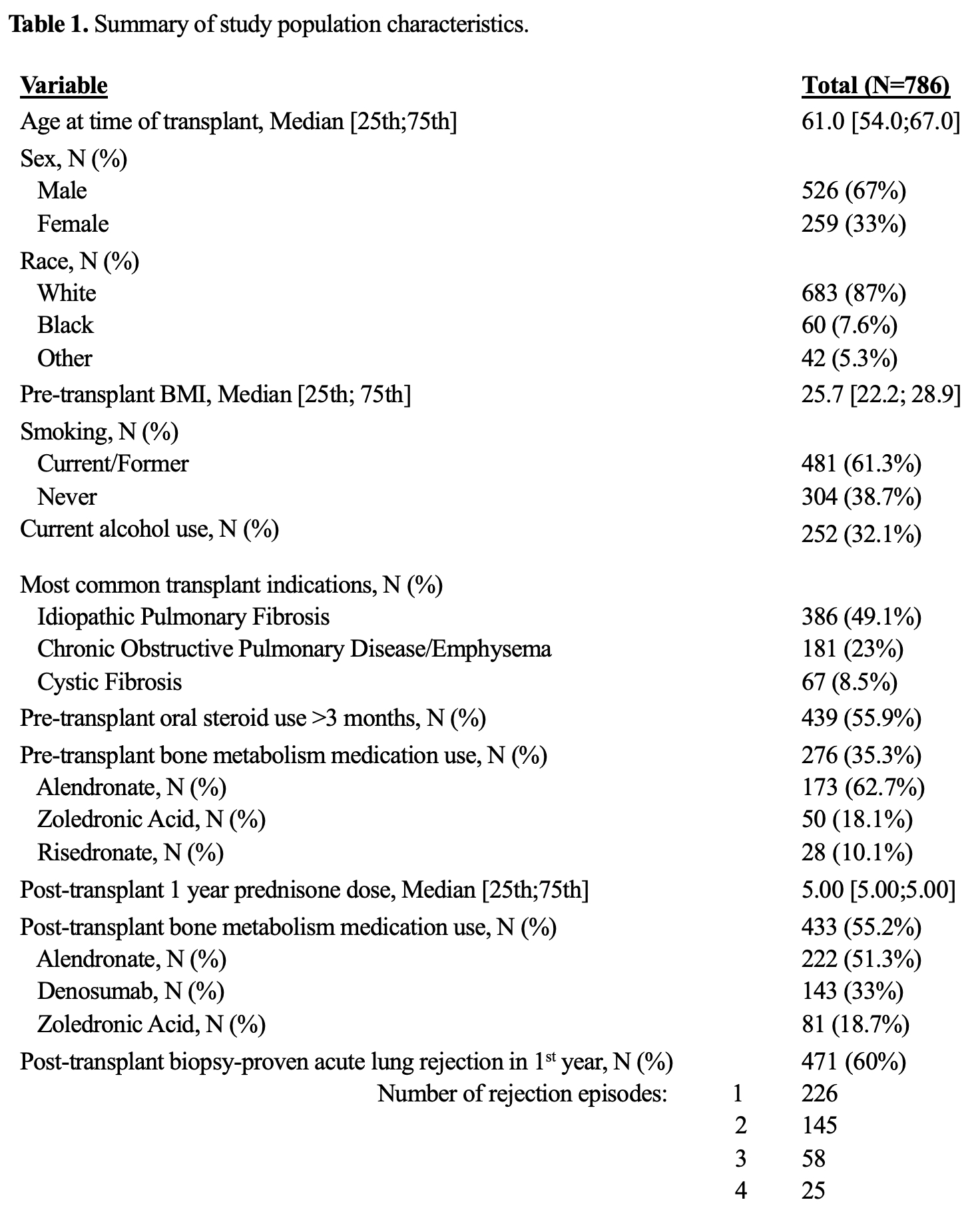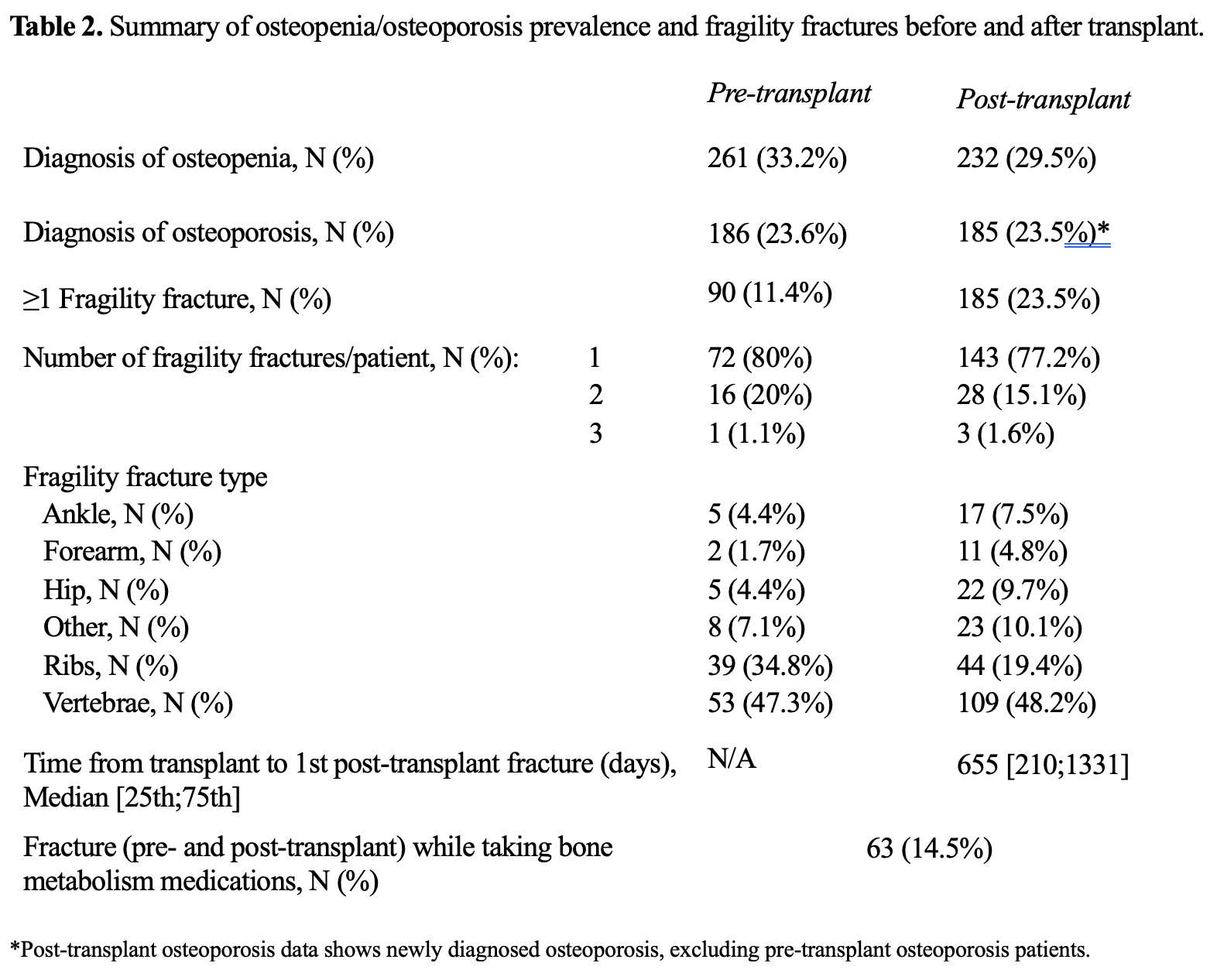Session Information
Date: Tuesday, November 14, 2023
Title: Abstracts: Osteoporosis & Metabolic Bone Disease – Basic & Clinical Science
Session Type: Abstract Session
Session Time: 4:00PM-5:30PM
Background/Purpose: Osteoporotic fractures are a well-known complication in LT recipients, significantly impacting their quality of life. Specific risk factors for these fractures in LT recipients are poorly understood, and universal guidelines are lacking. We aimed to assess the incidence of osteoporotic fractures in end-stage lung disease patients pre- and post-LT, while also identifying potential risk factors for post-LT fractures.
Methods: This retrospective cohort study was conducted at a large international transplant center, including adult patients who underwent LT between January 1, 2010, and April 14, 2018. Patients who expired within the first year post-LT or had prior LT were excluded. Endpoints comprised the incidence of vertebral and non-vertebral osteoporotic fractures post-LT, as well as potential risk factors for post-LT fractures, as determined by clinicians. Secondary endpoints included evaluating the impact of osteoporosis medications. Logistic regression modeling was employed to examine the relationships between potential risk factors and post-LT fractures.
Results: Out of 911 patients who underwent LT, 786 patients met the study inclusion criteria (median age: 61; 67% male; 87% white). The most common indication for LT was idiopathic pulmonary fibrosis (49.1%) (Table 1). Pre-LT, 186 patients (23.6%) had osteoporosis (T-score < -2.5), and ≥1 fracture occurred in 90 patients (11.4%), with vertebral fractures being the most common (53, 47.3%). Following LT, 185 patients (23.5%) developed new-onset osteoporosis, and 185 patients (23.5%) experienced at least one fracture, with 109 of these fractures (48.2%) being vertebral in nature. The median time to post-LT fracture was 655 days (Table 2). Post-LT, 55.2% received osteoporosis medications, with the most prescribed medications being alendronate (51.3%) and denosumab (33%). Notably, 14.5% of patients on bone metabolism medications experienced fractures either before or after LT.
A pre-LT diagnosis of osteoporosis was associated with a 2.04-fold increased odds of post-LT fractures compared to individuals with normal bone mass (95% CI 1.11-3.75, p=0.021). Compared to patients with age of 53 years (Q1), individuals aged 67 years (Q3) have 32% higher odds of experiencing post-LT fractures (95% CI: 1.03-1.69). Conversely, acute lung rejection episodes within the first year post-LT did not significantly increase the odds of post-LT fractures (95% CI 0.79-1.81, p=0.4) (Table 3).
Conclusion: Osteoporosis and fractures remain significant comorbidities in LT recipients. Pre-LT osteoporosis and age is a strong predictor of post-LT fractures, highlighting the importance of proactive management. Notably, pre-LT fractures, osteopenia, and long term pre-LT steroid use were not associated with an increased risk of post-LT fractures. Acute lung rejection episodes post-LT did not contribute significantly to post-LT fractures. The high incidence of fractures among patients on bone metabolism medications underscores the need for effective prevention and management strategies for LT recipients. These findings emphasize the importance of ongoing vigilance and the development of universal LT osteoporosis management guidelines.
To cite this abstract in AMA style:
Keller S, Vural A, Varley J, Mushtaq K, Abu Alya W, Tapryal N, Shaheen H, Budev M, Abelson A, Deal C. Risk Evaluation of Osteoporotic Fractures Following Lung Transplantation (LT): A Retrospective Cohort Study Conducted at an International Transplant Center [abstract]. Arthritis Rheumatol. 2023; 75 (suppl 9). https://acrabstracts.org/abstract/risk-evaluation-of-osteoporotic-fractures-following-lung-transplantation-lt-a-retrospective-cohort-study-conducted-at-an-international-transplant-center/. Accessed .« Back to ACR Convergence 2023
ACR Meeting Abstracts - https://acrabstracts.org/abstract/risk-evaluation-of-osteoporotic-fractures-following-lung-transplantation-lt-a-retrospective-cohort-study-conducted-at-an-international-transplant-center/



